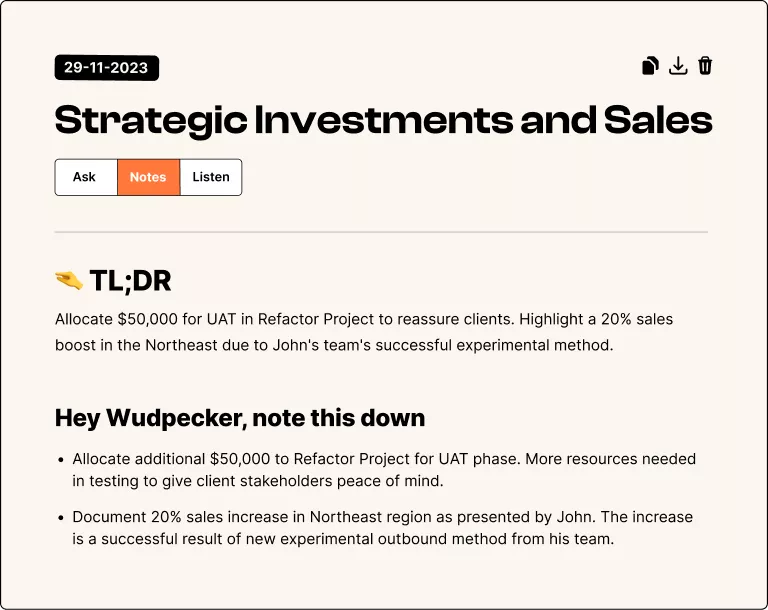Introduction
A meeting is as good as the insights you extract from the conversations. But insights can be time-consuming to extract. You need to set the right agenda so the meeting has focus. Then transcribe important quotes in the meeting, take notes whenever you can, find patterns, get action items, summarize the outcome, and follow-up with others. But now, with AI, lots of the tedious admin tasks can be taken away. AI can emerge insights that you might have otherwise missed.
Currently, I see many parts of the meeting lifecycle that benefit tremendously from AI, particularly in these touch points:
- Calendar management
- Agenda creation
- Sharing pre-meeting resource
- Meeting moderation
- Transcription & notetaking
- Meeting summary
- Follow-up & Task management
- Analytics and improvements
In some touch points, there are already solutions. But in others, no players exist yet. However, I still want to discuss the gaps which AI can help solve. Let’s go one by one.
AI in Calendar Management
Calendly, cal.com, Chili Piper have removed the pain of having to message back and forth with others about what’s the calendar slot that fits all 12 participants. But there are still gaps that the AI can improve.
When I book a slot on someone’s calendar, I still need to go back and forth about which day I have the least meetings. I prefer spreading the meetings out so I have both time for deep work and for interaction. But others might be the opposite. I know some sales reps prefer batching in their meetings in one day, and then not have any in others.
If AI can suggest the optimal slot based on your historical booking pattern, wouldn’t that be nice?
AI-driven agenda creation
Apps like Notion and Wudpecker have a wide range of built-in templates for users to prepare discussion points. It ranges from sales discovery questions to first candidate interview calls. But with AI, the templates can be generated based on the meeting information.
Sharing pre-meeting resource
Currently, employees often share resources via email or cloud storage platforms like Google Drive and Dropbox. However, these methods can be disorganized and time-consuming, as individuals need to manually search for and compile relevant materials. Imagine an AI solution that analyzes the meeting's agenda, identifies key resources, and automatically compiles and distributes a neatly organized folder to all participants. This AI application would streamline pre-meeting preparation, ensuring everyone arrives well-informed and ready to contribute effectively.
Meeting moderation
Traditional meeting moderation often relies on human facilitators to keep discussions on track and manage speaking time. Despite their best efforts, some participants may dominate conversations, while others are left unheard. An AI-driven meeting moderator could analyze the conversation in real-time, identifying when participants stray off-topic or when someone is dominating the conversation. The AI moderator could then gently steer the discussion back on track, ensuring that all voices are heard and the meeting remains focused and productive.
Transcription and note-taking
Note-taking apps like Evernote and OneNote help users to jot down important points during meetings. However, manually taking notes can be distracting and may cause participants to miss crucial information. An AI meeting recorder and note-taking tool would listen to the conversation and automatically generate comprehensive, accurate notes in real-time. This AI solution would allow participants to stay fully engaged in the discussion, while ensuring that important information is captured for future reference.
Meeting Summaries
Traditional meeting summaries often rely on manual note-taking and summarizing by one or more participants, which can be time-consuming and prone to human error. Additionally, these summaries may not fully capture the nuances of the conversation or accurately represent each participant's contributions. This can lead to miscommunication, confusion, and ultimately, hinder progress on the team's objectives.
An AI-generated meeting summary solution could address these issues by automatically capturing the main discussion points, decisions made, action items, and responsibilities, as well as any relevant data or insights from the meeting. By utilizing advanced natural language processing techniques, the AI application would be able to accurately transcribe and summarize the conversation, ensuring that no crucial information is lost or misrepresented.
Tools like Wudpecker are being integrated effectively into user’s Zoom, Google Meet, and Microsoft Teams meetings. The result is access to accurate, comprehensive information, which can improve communication, collaboration, and overall efficiency.
Follow-ups
Post-meeting follow-ups often involve manual task assignments and tracking in project management tools like Basecamp or Monday.com. However, this process can be time-consuming and prone to human error. An AI-driven task management system could analyze meeting notes and automatically assign tasks to relevant team members based on their roles, expertise, and workload. This AI solution would ensure that follow-up actions are promptly and accurately executed, preventing tasks from slipping through the cracks.
Analytics and improvement
While meeting feedback forms and analytics tools like Google Analytics can provide some insights into meeting effectiveness, they often require manual input and analysis. An AI-powered analytics solution could automatically gather data from various sources, such as meeting transcripts, participant feedback, and task completion rates, to generate insights on meeting productivity. By identifying trends and areas for improvement, this AI application would enable organizations to continuously optimize their meeting processes, leading to more effective and efficient meetings in the long run.
Conclusion: A Hopeful Future for AI-Enhanced Meetings
The potential for AI to revolutionize various aspects of the meeting lifecycle is immense. By automating tedious tasks, uncovering valuable insights, and fostering more effective communication, AI applications promise to transform meetings from time-consuming, unproductive gatherings into efficient, results-driven sessions.
Notice that there’s no doom and gloom of how AI will replace the us all. Rather, it serves to enhance and complement our natural skills and abilities. Without the boring routine and repetitive tasks, we can focus on higher-order functions, such as strategic thinking, creativity, and empathy – aspects that are innately human and crucial for productive collaboration.



.svg)




_.png)








.png)
.png)


.png)


.svg)
